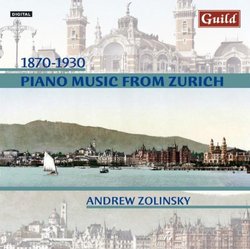| All Artists: Frey, Freund, Schulthess, Zolinsky Title: Piano Music From Zurich 1870-1930 Members Wishing: 0 Total Copies: 0 Label: Guild Original Release Date: 1/1/2007 Re-Release Date: 2/13/2007 Genre: Classical Styles: Chamber Music, Historical Periods, Classical (c.1770-1830) Number of Discs: 1 SwapaCD Credits: 1 UPC: 795754729221 |
Search - Frey, Freund, Schulthess :: Piano Music From Zurich 1870-1930
CD Details |
CD ReviewsHeavy Swiss Late-Romantic Piano Music by... Who? Hexameron | 08/25/2008 (5 out of 5 stars) "Amazon's product page does not list the compositions on this recording, and the MP3 album's tracks are jumbled and incorrectly titled (there is no "Toccata" piece). Here are the contents of the CD:
* Schulthess - Variations on a Characteristic Theme Op. 1 (14:44) * Frey - Piano Sonata No. 2 Op. 36 (18:40) * Frey - Suite No. 4 Op. 58 (28:00) * Freund - Notturno Op. 2 (7:28) I would be surprised if more than a dozen people currently living in the world have either heard the names or music of Walter Schulthess, Emil Frey or Robert Freund. Even a pianophile like me, an active explorer of all corners of the piano repertoire, has never heard of these three pianist-composers who studied and/or made their living in Zürich. The Guild label is a large proponent of very obscure German/Swiss composers and their sound-engineering, liner-notes, and performers are top-notch (ranking with Naxos, Hyperion, and CPO in my opinion). Little is written about Walter Schulthess (1894-1971), a seemingly nobody whose opus number reaches 12. Only in some of my older pre-WWII piano survey books is his name mentioned. His first opus, however, is a good work by any measure. The large-scale "Variations on a Characteristic Theme" is conservative for its time (early 20th-century), but this mere student work is full of expression and gravity. The theme itself is somber and slow. The variations contain little counterpoint and the piano-writing is somewhat virtuosic, but in a non-salon fashion. Perhaps late Brahms and early Busoni would be fitting stylistic comparisons. This Op. 1 is an intense work brimming with late-Romantic gestures and some incredible harmonic progressions that make for a breathtaking climax in the last variation. Emil Frey (1889-1946) is better known because he was a pupil of Faure and Widor and his output is much larger; he wrote concerti, symphonies, chamber music and pieces for solo piano. Like Schulthess, Frey conceives his works on an epic scale and prefers to emphasize an austere mood. However, Frey's musical language is more radical even though it remains on the precipice of late-Romanticism. His Second Sonata dates from 1917 and is tinged with middle Scriabin and Reger. The high point of the sonata is definitely the second "Allegro" movement, which explodes with emotional turbulence and displays an abundance of attractive ideas. But Frey's Fourth Suite, structured like a four-movement sonata, possesses a greater level of maturity and emotional weight. From the pensive and tragic "Andante" to the electrifying "Fugue," Frey's best melodic writing can be heard in this suite. I am particularly enraptured with the second "Allegro" movement, a memorable excursion which combines rhythmic elements of Prokofiev with the severity of Busoni. Robert Freund (1852-1936) is another unknown music figure and a true "Romantic." He studied with Moscheles, knew Liszt and Brahms, but later mentored composers like Bartok and Busoni. Freund's "Notturno" is appropriately tender and passionate with sentimental outbursts recalling Brahms; as a whole, it is third-tier piano music but still a pleasant listen. Bottom line: This is a significant release with world-premiere recordings of piano music of exceptional quality. Of these three Swiss gentlemen, Emil Frey is the better composer and he clearly needs a revival. I must also commend Schulthess's Op. 1, a stern and mighty piece worthy of any connoisseur's attention. I've heard the British pianist and composer, Andrew Zolinsky, on other Guild label recordings and can confidently vouch for his pianism: his technique is masterful and his interpretations are soundly dramatic and convincing." |

